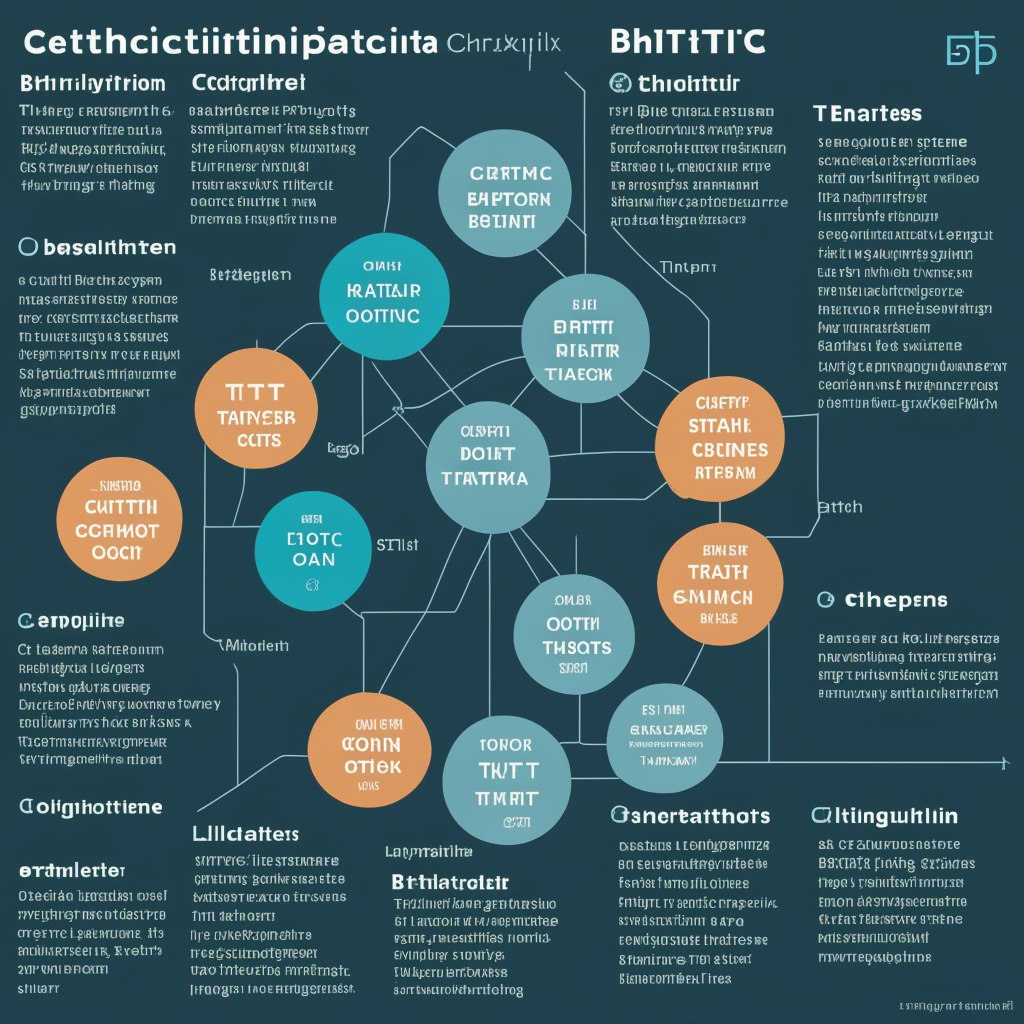“Ripple has withdrawn its offer to acquire Fortress Trust, citing a shift in its U.S growth strategy. This follows a substantial monetary loss at Fortress due to a security breach, leading Ripple to reassess and eventually retract its procurement offer, affecting other organizations associated with Fortress Trust.”
Search Results for: Obligate
EU’s DAC8 Cryptocurrency Tax Reporting Rule: Boost for Accountability or Over-Regulation Menace?
The Directive on Administrative Cooperation (DAC8) rule, aimed at monitoring and evaluating all cryptocurrency transactions within the European Union, was recently approved at the EU parliament. The goal is to assist tax authorities in tracking crypto-assets trade and profits, reducing tax fraud and evasion. However, it raises questions about potential over-regulation and its impact on member countries’ autonomy.
Bitcoin’s Rapid Recovery: Is it a Short Squeeze or a Blip on the Chart?
“Bitcoin’s sudden recovery to approximately $26,000 raises questions about the influence of major exchanges. However, without strong bullish catalysts, this resurgence may face resistance. Fears of an altcoin crash emerge as FTX exchange plans to offload an estimated $3.4 billion in altcoins, hinting at a bearish market for this crypto category.”
Impending UK Crypto Regulations: Trading Halts and Advertising Changes in the Crypto Sphere
“Luno, a crypto-platform under the Digital Currency Group, halts crypto-trading two days before the UK’s Financial Conduct Authority’s new rules take effect. Despite trading halt, the selling and withdrawal of funds will persist. New rules focus on clear, not misleading promotion of crypto trading. The adjustment aims to give potential investors better comprehension of the associated risks.”
Synapse Token Impacted by Sudden Liquidity Withdrawal: A Case of VC ‘Rug Pull’?
“Synapse’s native token took a substantial hit after a liquidity provider unloaded roughly 9 million SYN tokens and withdrew all stablecoin liquidity. This move, although confirmed not to be a security breach by Synapse, raised suspicion of a ‘rug pull’, causing a significant decline in the token’s value and user base.”
Sudden U-Turn for SEC? Grayscale’s Victory May Lead to Flood of Spot Bitcoin ETF Approvals
The US SEC, after a court victory by Grayscale, might see itself obligated to approve multiple spot Bitcoin ETF applications. This could result in a significant shift in cryptocurrency markets and mark a milestone in the evolution of cryptocurrency regulations.
South Korean Crypto Scandal: A Tale of Ethics, Regulations and Unknown Territories
“South Korean lawmaker, Kim Nam-kuk, retains his seat despite being involved in a $4.5 million crypto scandal. The event raises questions about ethics and integrity in the crypto industry against South Korea’s attempts to form a transparent and accountable crypto trading environment.”
Regulatory Spotlight on Impact Theory: An Examination of NFTs as Crypto Asset Securities
Los Angeles-based Impact Theory recently raised nearly $30 million via non-registered sale of non-fungible tokens (NFTs). Considered as crypto asset securities by the SEC, the company has allegedly violated federal securities regulations. Now under SEC scrutiny, the company is obliged to pay over $6.1 million as part of a settlement.
Navigating the New Taxation Pathway for Crypto: Benefits, Challenges, and Unresolved Questions
The US Treasury Department has defined centralized crypto exchanges and certain wallet providers as “brokers”, tying them with tax-reporting responsibilities. This response to the 2021 Infrastructure Investment and Jobs Act intends to bring clarity on taxation of digital assets. However, decentralized exchanges, miners and issues of individual privacy still remain in a grey area.
Navigating the Digital Ruble: Russian Banks Seek Clarity Amid Crypto Confusion
The Association of Russian Banks (ARB) is seeking clarity from Russia’s Central Bank on the eminent launch of Central Bank Digital Currency (CBDC), or digital ruble. In response to rising citizen apprehension, ARB is lobbying for specific regulations, such as prohibiting forced creation of digital ruble wallets and caps on digital ruble operator tariffs. However, ambiguity abounds regarding CBDC’s definition and potential global compatibility.
Uncovering the Shadows in Crypto: How Alameda Research’s Tokens Witnessed Suspicious Price Surge
“Tokens tied to Alameda Research saw a 30% rise in value after being listed on the now-defunct exchange FTX. This was allegedly aided by suspicious Twitter activity suggestive of market manipulation. The Network Contagion Research Institute report calls for more scrutiny and regulation in crypto markets to prevent potential inauthentic activity aiming to artificially inflate market values.”
Lithuania’s Crypto Regulation Paradox: Balancing Innovation and Risk
“Lithuania’s Financial Intelligence Unit is cracking down on anti-money laundering within cryptocurrency providers. The new regulation for Virtual Asset Service Providers, aimed at fostering a favorable crypto environment, also tackles the risks of fraudulent transactions by requiring stringent monitoring and reporting.”
FTX vs Alameda Research: The $71 Million Controversy Rattling Crypto World
“FTX and its sister company, Alameda Research, are at the center of controversy, trying to reclaim a hefty $71 million previously allocated to charitable organizations. This has sparked debates about the operations of cryptocurrency exchanges and the transparency of blockchain technology.”
Crypto Regulator Showdown: Thailand and Singapore Tighten Grips on Exchanges
Thailand and Singapore are intensifying scrutiny on crypto exchanges, particularly prohibiting retail lending and staking services, emphasizing investor protection. The ban restricts high-risk crypto activities among retail customers, while mandatory risk disclosure and customer acknowledgment of trading risks are required. In addition, Singapore mandates transferring all customer assets into a Trust by end of 2023.
Bitcoin Halving & June 2024 Futures: Preparing for Market Volatility in Crypto World
In anticipation of Bitcoin’s fourth mining reward halving in April next year, Deribit is listing June 2024 expiry futures and options, allowing investors to hedge against market volatility. This decision, driven by investor demand, highlights the importance of effective hedging strategies and showcases the high stakes in the crypto market.
Coinbase vs SEC: Battle for Crypto Regulation Clarity and the Future of US Crypto Industry
Coinbase’s Chief Legal Officer, Paul Grewal, criticizes the SEC’s evasive responses as Coinbase seeks a higher court to issue a “mandamus” obligating the regulator to create rules and standards for the crypto industry. The SEC’s actions have fueled skepticism about its intentions and effectiveness in regulating the market, leading to increased regulatory uncertainty and challenges in the US crypto landscape.
MiCA Regulation Impact: Preparing Crypto Firms for Compliance and Global Expansion
The upcoming Markets in Crypto Assets (MiCA) regulation in the EU urges cryptocurrency companies to prepare for compliance. Although not effective until 2024, securing licenses and aligning with new rules requires substantial time and effort, with benefits including cross-EU operational capabilities and potential global standardization.
SEC Ex-Official’s Stark Warning: Crypto Platform Dangers, Regulatory Issues & DEX Alternatives
Former SEC Enforcement Division chief, John Reed Stark, warns cryptocurrency investors to “Get out of crypto platforms now” due to regulatory ambiguities and insufficient customer protection measures on centralized exchanges. Decentralized alternatives, offering better security and compliance, gain traction as concerns over legal scrutiny and cybersecurity grow.
Binance Under Fire: US Senators Accuse Exchange of Deception and Seek Investigation
Binance faces scrutiny from US lawmakers, including Senators Elizabeth Warren and Chris Van Hollen, who accuse the exchange of potentially providing false information about its operations and local relationships. The situation underscores growing concerns regarding the regulation and compliance of cryptocurrency exchanges.
On-Chain Bond Issuance: A Leap for Sustainable-Agriculture and DeFi or a Regulatory Minefield?
Lamar Olive Oil has successfully issued an on-chain bond using Obligate, a Swiss DeFi platform, marking the first bond denominated in Membrane Finance’s EUROe. Built on the Polygon blockchain, Obligate aims to provide SMEs with a secure and transparent method of issuing, tracking, and settling debt. However, concerns around scalability, regulation, and security persist.
Unraveling the Role of Crypto Options Market Makers in Bitcoin and Ether Stability
Bitcoin and ether have exhibited rare calm due to competing influences and the crypto options market’s growing impact. Market makers maintaining long call positions, or positive gamma, must continually trade against spot prices, resulting in negative feedback loop, and keeping prices locked in a narrow range. As the options market affects spot prices, observing the interplay between them will be crucial for investors.
Texas Legislation Impact on Crypto Exchanges: Balancing Consumer Protection and Innovation
Texas state bill 1666 may require digital asset providers operating within the state to maintain sufficient reserves to fulfill customer obligations. The legislation aims to ensure consumer protection but may impose restrictions leading to additional costs for exchanges and customers.
Leveraged Bitcoin Futures ETFs: Reshaping Investment Landscape or Fueling Market Manipulation?
Valkyrie filed an application for a leveraged Bitcoin futures-based ETF, which differs from its existing BTF fund. With the SEC blocking attempts at a spot Bitcoin ETF, the debate over futures vs. spot-based ETFs continues, raising questions about the regulator’s understanding of the relationship between Bitcoin futures and the cryptocurrency’s spot price.
Binance’s Regulatory Troubles: Balancing Compliance, Innovation, and the Blockchain Future
The U.S. Department of Justice investigates Binance for allegedly allowing Russian customers to bypass sanctions. Binance faces continuous scrutiny from U.S. authorities, highlighting challenges in balancing regulatory compliance and innovation in the rapidly evolving cryptocurrency landscape.























